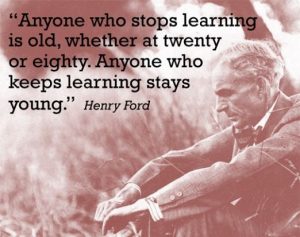
Author: Jo Kempster
The Vicar came the other day and said “at your age you should be thinking of the hereafter”. I told him “I do, no matter where I am, in the lounge or in the bedroom, in the kitchen or in the cellar, I ask myself – now what am I in here after?”
We all find ourselves in this situation and immediately put it down to old age. After all it’s what happens as you get older, you become forgetful, you lose your ability to retain information, you can no longer learn new things.
 Not true. Simon Tan, Psy.D., A.B.P.P., a clinical neuropsychologist specialising in geriatric neurological and psychiatric disorders at Stanford University Medical Center, says that there is a myth that as people age, their ability to learn often stops. The reality is that learning patterns may change and speed of learning may diminish but the basic capacity to learn is retained.
Not true. Simon Tan, Psy.D., A.B.P.P., a clinical neuropsychologist specialising in geriatric neurological and psychiatric disorders at Stanford University Medical Center, says that there is a myth that as people age, their ability to learn often stops. The reality is that learning patterns may change and speed of learning may diminish but the basic capacity to learn is retained.
With life expectancy increasing it is even more important that we keep our brains exercised in the same way as we work on our bodies. Externally this is certainly true and these days we look years younger than our parents did at 60 and above. Increased health consciousness means that for many of us this rings true internally as well. But what about our brains?
Anatomically, your brain isn’t a muscle; although it contains a bit of muscle, it’s predominantly grey and white matter, with cellular structure and function far different (and more complex) than that of muscle. However, there’s good reason why many people compare the brain to muscle – in both cases, the “Use it or lose it” principle applies.
Professor David Latchman Master of Birkbeck College, University of London feels if someone is over 60 they should be encouraged to embark on learning something new. It’s never too late to learn. A thought that is endorsed by NIACE – the National Institute of Adults Continuing Education.
A large proportion of Over 60s will continue working into their mid-late 60s, and for these people their minds will remain active. But for those who no longer work, or are perhaps housebound because of illness, there is a very real danger that they will sink into apathy and lose all motivation to learn.
This is where modern technology can come into its own in the form of e-learning. The beauty of this is it can be used almost anywhere with relatively low financial outlay. The current Over 60s almost all already have mobile phones which means, whether they know it or not, they are computer literate. This means they are easily able to access the enormous array of online courses that are already available.
For those who are less confident with computers there are many online courses that teach the various IT programmes including many social media websites such as using the Internet, Facebook, Twitter and Outlook. For those who may want their views heard there are courses on Blogging and Vlogging.
There is a huge array of languages to choose from and with the audio support you can learn how to speak the language as well. Imagine being able to try it out in the comfort of your own home without the embarrassment of anyone else being able to hear your attempts! Many courses have long periods of availability allowing you to learn at your own pace and to return to the learning as many times as you want. As it ages the brain takes longer to retain knowledge and being able to repeat the learning as many times as you want aids this process.
 Why not become knowledgeable in creative writing and write the novel that you’ve always known you had inside! Or perhaps you would prefer to learn the art of autobiographical writing and record the life of a friend who may have done amazing things in their life.
Why not become knowledgeable in creative writing and write the novel that you’ve always known you had inside! Or perhaps you would prefer to learn the art of autobiographical writing and record the life of a friend who may have done amazing things in their life.
Melissa March is Chief Executive of Learning for the Fourth Age, a charity dedicated to bringing trained volunteers into care settings where they work with residents. “There is lots of interest in IT and the connections that email can bring. Our work helps break down older people’s fears about young people and opens our volunteers’ eyes to the lives of older people with very different experiences from their own.”
Online learning is a perfect match for Care Homes where many of the occupants may have physical challenges but still retain their mental faculties. Courses often also have online tutors providing extra support to learning. Many of the courses have tests at the end, some of which come with accredited certificates or at a least a completion certificate, so why not have a Graduation Day? Visiting relatives in a Care Home is often not seen as a pleasure but what fun to go and see Granny (or even Great Granny) graduate in Floristry, Hair Care, French, Chinese and Manual Handling!
Jaye Keightley, Active Coordinator, Aigburth Residential Care Home, says, “Without question, I would advise other activity co-ordinators to just do it! The possibility of learning again or developing new skills and passions is a priceless gift offered to too few elderly people who live in care homes. I am so grateful for the opportunity to provide residents with learning opportunities and all the care staff now are involved in supporting residents to follow their interests throughout the rest of the week. Whenever learning is taking place at the care home, there is a real buzz about the place and everyone is very happy.”
To paraphrase a famous slogan – the future for Over 60s is bright, the future is e-Learning!
Why not take a quick look at the courses available by clicking HERE.







 UK: 0844 854 9218 | International: +44 (0)1488 580017
UK: 0844 854 9218 | International: +44 (0)1488 580017








